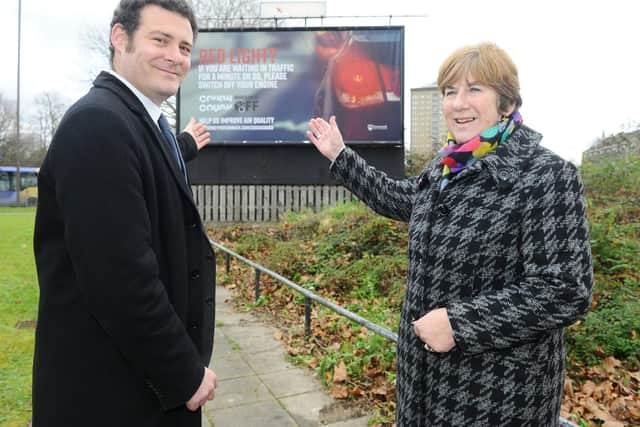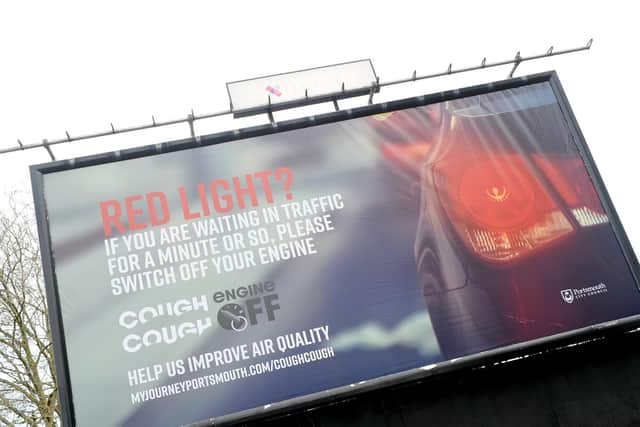Bid to cut pollution in Portsmouth with new anti-idling campaign


Portsmouth councillors are urging motorists to cut their engines whenever possible to improve air quality, and reduce the amount of associated health problems in the city.
Figures from Public Health England show that in Portsmouth air pollution contributes to 95 deaths a year, with 50 per cent of that pollution created by traffic including cars, buses and heavy goods vehicles (HGVs).
Advertisement
Hide AdAdvertisement
Hide AdIdling can be identified as leaving a car engine running unnecessarily - such as at a junction you know will be red for a while, at a train crossing, while waiting to pick someone up or when de-icing your car.


The scheme, funded by a £450,000 government grant, has seen posters, billboards and electronic message boards across the city displaying the slogan: 'Cough, cough. Engine off.' It will also reach a young audience with awareness talks planned for city schools.
Councillor Dave Ashmore, head of environment, said: 'The Highway Code states that drivers must not leave a vehicle engine running unnecessarily while that vehicle is stationary on a public road.
'So not only is idling an offence, it is damaging to the environment. Our campaign reminds drivers to turn off their engine when not in use, but also highlights the damaging affect vehicle pollution has on the environment and our health.
Advertisement
Hide AdAdvertisement
Hide Ad'We want it to be seen as a social menace like littering or throwing cigarette butts on the ground. It's about getting people to change their behaviour and their view on what is acceptable.'


The council's transport boss, Cllr Lynne Stagg, was concerned that most of the issue was caused by over-reliance on cars. 'The number of people living in Portsmouth increased between 1971 and 2011 by 50 per cent, but the number of cars in that time increased by 270 per cent,' she said.
'At some junctions in the city you could be stuck at a light for over three minutes, or if you're stuck at a train gate it will probably be longer than that. So why leave your engine running?
'In this city 95 deaths are caused by pollution in the air. And it especially affects young people as they grow up and can lead to all sorts of problems.'
Advertisement
Hide AdAdvertisement
Hide AdThe campaign adverts are positioned in the city's five air quality management areas (AQMAs) which are points with the highest levels of nitrogen dioxide (NO2) in the air.
These include the A3 into Commercial Road, along Fratton Road, Kingston Road and London Road and on Eastern Road coming into Milton.
In 2017 these locations were recorded as having above 40 micrograms of NO2 per cubic metre of air which is higher than government and EU directives.
More information from the council can be found here
Myth busting facts about idling
My engine needs to stay on to keep the battery warm
False. Improved battery design has largely eliminated this threat.
Turning the engine on and off wears it out
Advertisement
Hide AdAdvertisement
Hide AdFalse. Electronic ignitions in modern cars have eliminated this problem.
Catalytic converters need to be hot to work properly
True, but an idling engine does not keep a catalytic converter warm. They retain their heat for about 25 minutes after an engine is switched off anyway.
Idling keeps an engine in better condition
False. Idling means incomplete combustion, leading to a build-up of residue in an engine, increasing wear and tear.
Starting an engine uses more petrol than idling.
False. In fact, for a majority, engines idling for more than 10 seconds use more petrol that starting the motor.
Advertisement
Hide AdAdvertisement
Hide AdThe best way to warm up your vehicle is to leave the engine running for a few minutes
False. You only need to run the engine long enough to get the oil circulating (about 30 seconds) before driving away.
Idling reduces wear and tear on your engine particularly when cold
False. Idling creates wear and tear on your engine because fuel does not combust completely, and some fuel residue can condense on cylinder walls. Excessive idling can cause condensation to form in the exhaust, which may result in corrosion and reduced lifespan of the exhaust system. But the most severe damage is to the connecting rod bearings. This happens because of the relatively slow speed of the engine, more pressure is exerted on the bottom centre and top centre of the bearings.